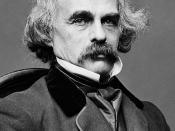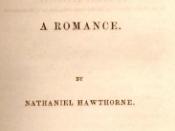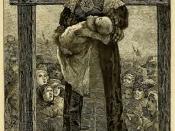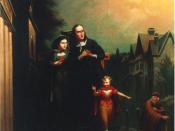Everyone enjoys attention and affection, but not everyone recognizes how particularly important it is for development of human beings. People are always looking for affection, but for those who neither give nor receive love become mistrustful and vengeful. Nathaniel Hawthorne explores the idea that "love conquers all" in his novel, The Scarlet Letter. Hawthorne shows that love drives away one's negative qualities, allowing the person to open up and be his true self.
Parental love changes the nature of the child. Pearl only had one of her parents, causing her to be half evil. Without the love from her father Pearl becomes rebellious, showing that she yearns for more attention. When she sees Dimmesdale, Pearl "[takes] his hand in grasp at both her own, laid her cheek against it"æ. her mother, who was looking on, asked herself "ÃÂIs that my Pearl?'" (126-7). In the presence of her father, Pearl shows an affection even her own mother is surprised to see.
For that moment, the evil is driven away from her and she is brought into compassion and sincerity. Pearl is now showing characteristics that show that she does have passion inside her; it just needs to be brought out by fatherly love. When Dimmesdale publicly shows his love for Pearl, the narrator says, "Pearl kissed his lips. A spell was broken. The great scene of grief, in which the wild infant bore a part, had developed all her sympathies"æ. She would grow up amid human joy" (287). At this instant, Pearl has changed into a different person. She is no longer a mischievous little girl, but rather a caring, loving person. The "spell" that caused her to mock and deceit others has finally been broken when she receives the love that she has been yearning for.
In addition, the love shared between lovers brings out their true selves. Hester is able to break away from the Puritan beliefs that confined her from Dimmesdale. As a result she reaches a great level of intimacy and opens up to Dimmesdale, revealing her true self. In the forest, when Hester and Dimmesdale decide to move away and become a family "she undid the clasp that fastened the scarlet letter, and, taking it from her bosom, threw it to a distance among the withered leaves" (226). Through the love they shared, Hester is able to let go of this symbol that determines her identity. This shows that Hester lets go of the town's perception of her identity and finally decides to create her own identity instead of being judged and stereotyped because of this letter. With this new desire to create her own identity, it is evident that Hester decides to reveal her "true" identity as the narrator says that "[Hester's] sex, her youth, and the whole richness of her beauty, came back from what men call the irrevocable past" (227). Even when others think that Hester's true identity is irrevocable, she is still able to return to her true form through the love she shares with Dimmesdale. Hester is turning back into the woman she used to be because she no longer feels that she has sinned. She breaks away from the town's belief and creates her own where she and Dimmesdale have not sinned, but rather showed their love for each other. With her newly found beliefs, she has altered her identity for the better.
On the other hand, there are those who never receive love and as a result become malicious and hateful. Chillingworth has no one to show affection to so he plans to ruin the lives that do experience love. Nine years ago before Hester fell in love with Dimmesdale, he describes his life by saying, "No life had been more peaceful and innocent than mine"æ. Was I not, though you might deem me cold, nevertheless a man thoughtful for others, craving little for himself?" (192). Through the jealousy of seeing his wife falling in love with another man, Chillingworth has transformed into a vengeful human. He was changed from his true, peaceful self, into a jealous, malicious man all because of his lack of love and compassion. Now Chillingworth only lives for revenge, not for love. Since his only reason to live is to torment Dimmesdale, when Dimmesdale dies "there was no more Devil's work on earth for him to do, it only remained for the unhumanized mortal to betake himself" (291). With no more reason to live, Chillingworth dies too. His vengeful heart keeps him from finding love with others and he dies a hateful man. He was blinded by his own jealousy and hate and he did not come to realize that he needed love in his life.
One's true self can only to revealed by driving away the negative qualities with love. Love uncovers the goodness and beauty inside a person. It changes a person for the better but without love, one just becomes mistrustful and hateful. It is important to see that love is imperative in human life because life is not meant for hate and revenge, but for affection and compassion.





